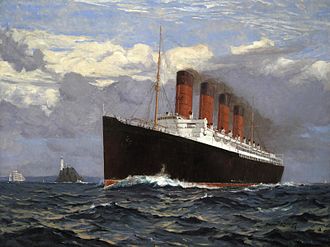Historians are storytellers. They are able to tell a story of days past. A master historian is able to tell the story as though it were fictional. Master historians I believe include such greats as; Doris Kearns Goodwin, Walter Isaacson, Nathaniel Philbrick, David McCullough, to name a few. After reading the book, Dead Wake, I cannot leave off this list Erik Larson. (Also for his fantastic book, The Splendid and The Vile.)
Mr. Larson tells the tragic story of the Lusitania in such a fashion that one cannot possibly believe this actually happened. That a U-boat commander could be so evil, or that a government would give a U-boat commander the authority to sink, “any ship,” that was in the “shipping lane” regardless Man or War, or passenger liner. Mr. Larson’s well documented research takes the reader to an understanding of the sinking of this majestic ship, however, its bounty could never be justified.

From the time it was docked in New York, to the sinking near Queenstown, Ireland, Larson puts the reader inside the ship. His detail description of the ship leaves nothing to the imagination. His research into the numerous records and letters of the ship’s crew and passengers makes the reader feel they are on the ship as well. Larson did not just tell the story from the deck of the Lusitania. He researched the background of the U-boat (U-20), and her Captain., which sent the great ship to the ocean floor.
He further told of a somber President (Woodrow Wilson) who was so shocked over the sinking that he could not decide if war was appropriate at the time. His cabinet ultimately decided it was not and so President Wilson went along.
However, an irritated Winston Churchill later held President Wilson accountable for not entering into the war after the sinking of the mighty ship. Churchill wrote, ‘What he did in April, 1917, could have been done in May 1915. And if done then what abridgment of the slaughtered; what sparing of the agony; what ruin, what catastrophes would have been prevented; in how many millions of homes would an empty chair be occupied today; how different would be the shattered world in which victors and vanquished alike are condemned to live!”(1)
I believe that every school in America should be required to read and discuss this book in detail. The sinking of this ship not only brought America closer into World War I, but it made America cross a threshold were there was no turning back. Hopefully the past will never be repeated in this fashion. Another great piece of work, Mr. Larson.
Note:
- Churchill wrote this in his book, The World Crisis, 1916-1918. The sinking of the Lusitania occurred on May 7, 1915, and Churchill believed the Americans should have immediately entered the war. In fact Larson notes a conspiracy theory in which the British Admiralty knew that U-20 was in the area and did not alert, or send destroyers to protect the Lusitania, in the belief America would immediately enter the war if the Lusitania was sunk by the Germans.
Leave a Reply